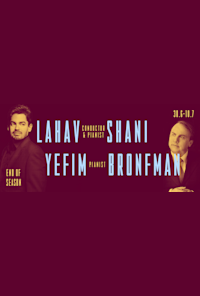Two magnificent 20th-century works tell the story: Leonard Bernstein's Chichester Chants and Igor Stravinsky's Psalm Symphony. Blade Two continues to intrigue and surprise in the performance of the works of two musical giants who combined old with new and created a unique musical language that is avant-garde and exciting at the time. These two fascinating works will be completed by Rachmaninov's third concerto performed by one of today's greatest pianists - Yafim Bronfman.
In 1930 the Boston Symphony Orchestra celebrated its jubilee. Its then artistic director, renowned conductor Sergei Koswitzky, decided to celebrate the event by ordering a new symphony from one of the period's most prominent composers - Igor Stravinsky. But Stravinsky did not want to write "just" a symphony. His tumultuous personal life and final expulsion from the USSR brought him back to the bosom of religion he had moved away from in his adult life, a process that motivated him to write a liturgical work based on the Latin translation of Psalms. "- A sophisticated and spiritual work that celebrates divinity and faith in a personal, authentic and uncompromising way. For example, in the great pause of the second movement, which is a clear reference to Johann Sebastian Bach, but at the same time Stravinsky did not fall into nostalgia but created a bold and surprising musical world. The two forces.Also in terms of orchestration Stravinsky rebelled against conventions when he chose to omit instruments with a main soft sound such as violins, violins and clarinets and put the spotlight on instruments of a sharp and light character such as metal wind instruments, percussion and two pianos. This unique orchestration emphasizes the turbulent and cruel aspects of the religious text and distances the work from the sentimentality that characterizes other liturgical works. The third chapter is the most provocative: Stravinsky uses the famous hymn of the three "... Goddess in drum and dance ... Goddess in cheers ...", but surprisingly this is the most abstract and quiet chapter. Stravinsky composes music that contrasts with the pompousness of the text, thus perhaps telling us his opinion on what belief is.
Music of peace
35 years later another great composer received an invitation to write a solemn oratorio. It was Leonard Bernstein who was asked to write an orchestral work based on a psalm for the Chichester Cathedral Festival in England. Bernstein wrote "Chichester Hymns" for orchestra, choir and soloist, a work that continued his prolific pursuit of Jewish heritage and its lyrics. Like the Psalm Symphony, the Chichester hymns distill Bernstein's musical personality through a brilliant display of compositional skill. But unlike Stravinsky, who wrote a bold and innovative work precisely during a "classical" period of his writing, Bernstein took the opposite approach. In 1965 Bernstein took a sabbatical from his position as musical director of the New York Philharmonic, and engaged in the study of revolutionary musical styles of the time. The works he wrote that year were experimental and reflected extreme trends that took place in the world of post-World War II music and charter. But the Chichester hymns were radically different, in which Bernstein devoted himself to his artistic truth and wrote a strictly "Bernsteinian" work: rhythmic, tonal, jazzy, combining old and new in an expressive and touching way. Bernstein has retained the traditional structure in which the outer chapters are rhythmic and stormy, and the second chapter is quiet and touching with a heavenly vocal line performed by a child, to the words of the immortal hymn "H. Roi will not be missed." As a politician, Bernstein did not remain indifferent to the events of the period and hid between the sounds of his new work a message that was aimed at the Middle East with regard to the Israeli-Palestinian conflict that was raging at the time. To the lyrics in Hebrew Bernstein composed choral music that clearly characterizes Christian liturgy, an artistic choice that sought to convey a message of coexistence and peace.
Chichester hymns and the Psalm Symphony provide an extraordinary musical experience thanks to rich orchestration, exceptional use of the choir, and the presentation of a traditional and familiar text through a new musical language. Beyond that, they allow for a fascinating look at two great composers of the 20th century, who managed to bridge tradition and progress without sacrificing an exciting emotional experience. Along with Rachmaninov's third concerto for piano and orchestra performed by Yafim Bronfman, a rich and exciting symphony evening is expected that connects old and new worlds


